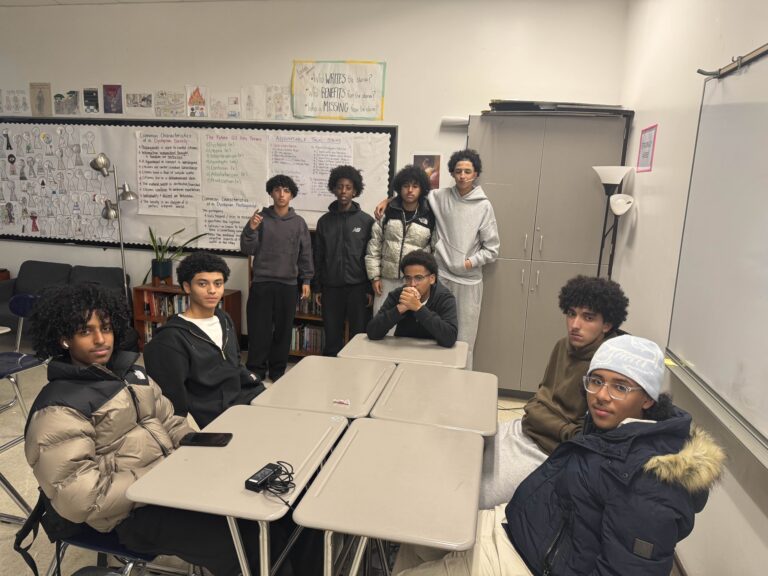
Midterms. The mere mention of the word can send shivers down students’ spines. This period of intense academic pressure—typically occurring halfway through the school year—is a breeding ground for anxiety, stress, and a general sense of dread. While a certain level of challenge is motivating and healthy, excessive educational strain can negatively impact a student’s mental and physical well-being, hindering their overall performance in school. Despite high expectations and toilsome study sessions, midterms offer educators, students, and guardians an opportunity to reflect, learn, and improve.
Midterm Madness
According to Malden High students, midterms are a multifaceted experience, with a majority loathing the strenuous mental pressure and others seeing the benefits of the school-wide testing. “Students are overwhelmed enough juggling different things like homework, jobs, after-school activities, etc., that midterms—to an extent—become your life for a while with the excessive studying for most of your classes,” explained sophomore Trini Le.
Adding to Le’s argument, sophomore Lilian Fang expressed, “Many teachers don’t give us sufficient time to study or don’t go over everything on the test. Many classes haven’t even decided if they are going to give a midterm or not.”

While many view the effects of exam-related stress on students as prominently mental, academic pressure can have physical drawbacks as well. In 2018, a study from the National Bureau of Economic Research investigated a hormone called cortisol, which is directly related to stress and academic performance. The study found “15 percent more cortisol” in students’ bodily systems on the day of high-stakes testing, proving a direct correlation between stress and testing. “It can be challenging for students who do not thrive in [testing] environments—especially timed ones—to perform to the best of their abilities,” pointed out counselor Sharon Lee, a former MHS alumni.
Factors such as perfectionism, course load, parental validation, lack of self-care, and time management all contribute to midterm anxiety. Students who pursue flawless scores often lose themselves in their studies and obsess over minor mistakes—leading to pessimistic self-talk cycles—whereas lack of organization may result in all-nighters and cram studying, both providing zero aid to desired test scores or emotional welfare.
“Time management is tremendously difficult with a high school schedule. Aspects such as large amounts of homework, studying for quizzes, sports, clubs, and much more can impact the amount of time you put into education,” commented freshman Ruby Neicth Forbes.
The main issue that consistently troubles students is the amount of information they have to retain for the big test, containing almost five months’ worth of content. “It’s a lot, especially if you’re taking AP classes,” shared senior Nashlyn Rubert. It is grueling and tiresome for students—who all have a life outside of school—to spend hours memorizing every tiny detail learned since September for a heavily weighted test lasting 80-90 minutes. Additionally, if we consider test anxiety, midterms are not a fair judge of character or grades for students who struggle on tests but excel in class, one test score should not cause a feeling of apprehension in students’ minds.
“I’m ready for them to be over,” voiced freshman Vicky Ye.

The Other Side
However, midterms and finals—when implemented effectively—can serve as a valuable tool for students, teachers, and guardians alike, fostering deeper learning and advancements. The midterms are a wonderful method for everyone involved to build on their strengths and learn from their weaknesses.
Students who are unsatisfied with their grades can take advantage of the upcoming test by scoring proficiently and getting the boost they want. In this manner, midterms and finals act as powerful motivators, encouraging consistent effort and focused studies. In fact, a study by the National Center for Education Statistics found that students who consistently studied for assessments demonstrated significantly higher academic achievement compared to those who did not.
Martin Berryman, a 10-12th chemistry teacher at Malden High, conveyed the importance of students to “reflect, synthesize, and summarize” the cumulative information they have learned from the “previous quarters,” emphasizing the “great opportunity” students have to master a skill such as taking “a big comprehensive test” similar to ones they may face in college.
While all students do not plan on attending college after high school, it is necessary for those who will take this path to have proficient study skills, because an entire semester’s grade in university could be a midterm or a final exam. High school’s main task is to prepare students for the life ahead of them, and for many, it is college life, which entails taking comprehensive tests. Even for pupils who do not wish to go to college, midterms and finals can improve skills such as productivity, discipline, reduced procrastination, and organization.

US History teacher Ashley Garlick explained, “Teachers can collect data on how students are doing, how they’re improving, and where they can make adjustments within their teaching to ensure students are actually learning. They’re a good way to measure individual student performance and growth.”
Additionally, the exams enhance constructive communication between teachers and students by closing the gap and providing students with personalized feedback and guidance. Before midterms, teachers give their best to prepare students by passing out study guides and reference sheets, as well as offering one-on-one study sessions for those who need extra support. Many teachers stick around after school until 2:45-3:00 pm for anyone who would like to complete missing work and make up tests or talk about their grades. Between all the nerves, bonds between staff and students tend to grow stronger.
“To refresh my students’ memory, I help them study and review by playing games, and posting all the notes and handouts on Google Classroom from September…It’s a challenge to remember all the materials and having the resources can make a huge difference,” stated Joshua Sellers, a Math 2 and Statistics teacher.

Midterms can further act as a checkpoint for guardians to reflect on their child’s progress and analyze in what manners they can support them both academically and emotionally
“It’s quite exciting because [midterms] show how far we’ve gotten in the year,” proclaimed freshman Priscarla Villefranche.
The Middle Ground: A Truce
Between the difference of opinions, midterms have brought one thing in common: a desire for change. Both teachers and students have voiced modifications needed to be made to Malden High’s process of taking midterms, starting with its scheduling.
“For us to have meaningful midterms, students and teachers need to have a week to prepare for these huge tests. Proper review schedules and a week dedicated purely to midterms will allow students to get a feel of college since that’s how it works,” continued Berryman.
If students or educators do not have sufficient time, the results of the midterms will be skewed and inaccurate, wasting collaborative efforts. However, giving time should not mean a jam-packed schedule. “Students should have no more than two tests a day, the ability to leave and go home after their exam, get food, rest, and then study for their next exam. The way the schedule is right now, they don’t have a break,” added Berryman.
Another idea is an alternative to midterms and finals. Some students would prefer a hands-on activity that portrays their understanding of the semester in a physical manner rather than memory-based. “Alternatives to midterms or finals could be based around a project or presentation rather than a stressful test, but I feel like if there could be alternatives it should be up to the teacher of the class on how they wish to do it,” expressed junior Liam Gallagher.
English classes from freshman to senior year create portfolios for their midterms and finals, which means other classes could potentially create an agenda incorporating the idea. For instance, science classes calculating scores based on a timed lab, and history teachers assigning timeline projects could be appropriate alternatives. Yet, for educators to create labs and projects, they need to have the time and resources to provide their pupils with proper assessments which, unfortunately, they do not.
Lee explained, “All the different options help students reflect their understanding in whatever style works best for them, showcasing their strengths.”
Midterms are an inevitable part of the academic experience, and a certain level of stress is to be expected. However, by understanding the sources of stress, developing effective coping mechanisms, and prioritizing self-care, students can navigate this challenging period more effectively. By embracing healthy study habits, seeking support when needed, and cultivating a positive mindset, students can not only survive midterms but also thrive academically and personally.





